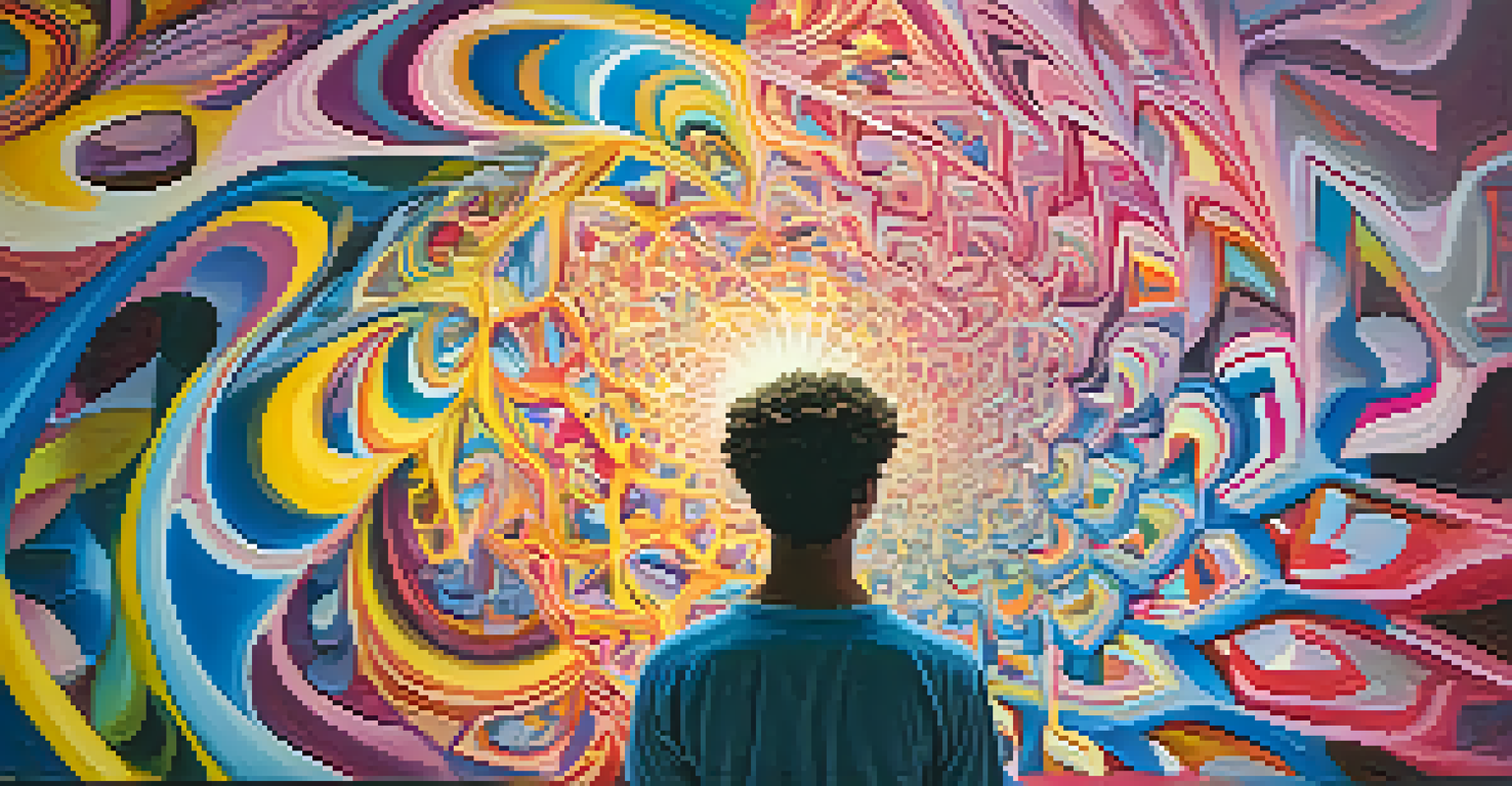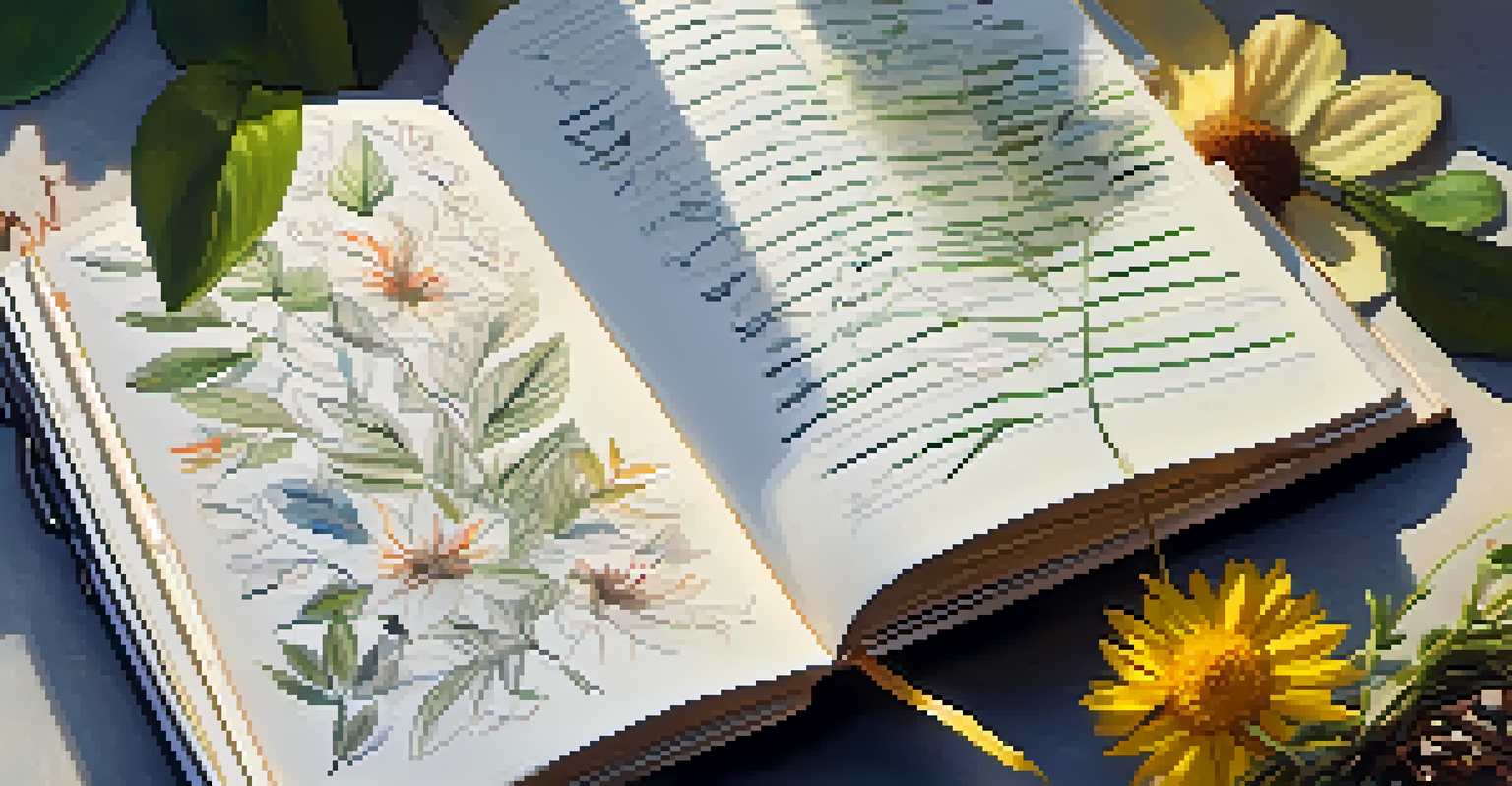Psychedelic Experiences and Their Impact on Narrative Craft

Understanding Psychedelics: A Brief Overview
Psychedelics are substances that alter perception, mood, and cognitive processes. Common examples include LSD, psilocybin, and DMT. These compounds have been used for centuries in various cultures for spiritual and healing purposes, but their impact on creativity is often overlooked.
Psychedelics can help us to see the world in a new way, opening up pathways for creativity and insight that we might not have accessed otherwise.
When people experience psychedelics, they often report a sense of interconnectedness and enhanced creativity. This can lead to unique insights that are deeply personal yet resonate universally. It’s like viewing the world through a new lens, where colors are brighter and ideas flow more freely.
In the context of narrative craft, these experiences can spark innovative storytelling. Writers may find themselves breaking free from traditional structures, allowing their imaginations to roam wild. The result? Narratives that are not only captivating but also transformative.
The Creative Process: How Psychedelics Influence Writers
Many writers describe their creative process as a journey filled with highs and lows. Psychedelic experiences can amplify this journey, providing new perspectives on familiar themes. Imagine a writer sitting in front of a blank page, suddenly seeing a vibrant tapestry of ideas unravel before them.

Engaging with psychedelics often encourages a more open mindset, leading to unexpected connections between ideas. This can result in rich metaphors, vivid imagery, and plots that twist in fascinating ways. For example, a simple story about love might evolve into an exploration of the cosmos and the nature of existence.
Psychedelics Enhance Creative Insights
Psychedelics can spark innovative storytelling by providing new perspectives and fostering unique connections between ideas.
Ultimately, the infusion of psychedelic insights can breathe new life into narratives. Writers who embrace these experiences might find themselves not just telling stories, but creating entire worlds that challenge readers to think differently.
Breaking Narrative Conventions: Psychedelic Influence
One of the most exciting aspects of psychedelic experiences is their ability to challenge conventional storytelling. Traditional narratives often follow a linear path, but psychedelics can lead to fragmented or non-linear storytelling. This mirrors the experience of a psychedelic trip, where time and space can feel fluid.
The creative process is a journey of discovery, and sometimes you have to venture off the beaten path to find the treasure.
Writers like Hunter S. Thompson and Aldous Huxley have famously incorporated these unconventional structures into their work. Their narratives often feel chaotic yet profoundly meaningful, reflecting the mind-bending nature of their experiences. This approach invites readers to engage with the story on a deeper level, sparking their own reflections.
By embracing narrative freedom, writers can create works that resonate on multiple levels. This not only broadens the scope of storytelling but also challenges audiences to reconsider their own perceptions of reality.
The Role of Emotion in Psychedelic Narratives
Psychedelics often evoke intense emotions, which can profoundly influence storytelling. When writers tap into these emotions, they create narratives that are rich in depth and resonance. Think of a well-crafted story that makes you laugh, cry, and reflect—all of these emotions can be magnified through psychedelic exploration.
This emotional depth can lead to characters that feel more authentic and relatable. Readers are drawn to stories that evoke genuine feelings, and the heightened emotional state induced by psychedelics can help writers achieve this. It’s like adding vibrant colors to a black-and-white painting, making the characters leap off the page.
Emotional Depth Enriches Narratives
Engaging with psychedelics can amplify emotional experiences, leading to more authentic and relatable characters in storytelling.
Incorporating emotional experiences into narratives encourages readers to connect with the story on a personal level. This connection can be transformative, allowing readers to explore their own emotions through the lens of the characters’ journeys.
Imagery and Symbolism: Expanding Creative Horizons
Psychedelic experiences are often accompanied by vivid imagery and symbolism, which can significantly enhance narrative craft. Writers might find themselves inspired by the surreal visuals they encounter during a trip, leading to striking descriptions and inventive metaphors. It’s as if the mind unlocks a treasure chest of creative potential.
For instance, a simple scene in nature can transform into a lush, dreamlike landscape filled with vibrant colors and unusual creatures. This embellishment not only enriches the narrative but also allows readers to immerse themselves fully in the writer's vision. The imagery becomes a character in itself, shaping the reader's experience.
By weaving psychedelic-inspired imagery into their work, writers can create stories that linger in the minds of readers long after the last page. This layer of visual richness adds to the overall experience, inviting readers to explore deeper meanings within the narrative.
The Therapeutic Potential of Psychedelics in Writing
Psychedelics have been gaining attention for their therapeutic potential, and this extends to writers as well. Many find that engaging with these substances can help them overcome creative blocks or personal struggles. It’s like clearing away cobwebs in the mind, allowing fresh ideas to flow.
Through these experiences, writers can confront their fears and insecurities, leading to personal growth and enhanced creativity. This process often results in more authentic storytelling, as writers draw from their own journeys of healing and self-discovery. The stories become not just fictional creations, but reflections of their true selves.
Ethical Considerations in Writing
Writers must navigate the ethical implications of portraying psychedelics, ensuring honest representation while fostering informed discussions.
As the stigma around psychedelics continues to diminish, more writers may explore their benefits. This could lead to a new wave of literature that not only entertains but also heals, creating a powerful connection between the writer, their work, and the reader.
Navigating Ethical Considerations in Psychedelic Writing
While the benefits of psychedelics in narrative craft are compelling, it’s essential to navigate the ethical considerations surrounding their use. Not everyone has the same experiences, and what inspires one writer might not resonate with another. This subjectivity must be acknowledged when discussing storytelling.
Additionally, the portrayal of psychedelics in literature can influence public perception and access to these substances. Writers have a responsibility to share their experiences honestly, avoiding romanticizing or trivializing the potential risks. It’s crucial to foster informed conversations about psychedelics and their impact.

By addressing these ethical considerations, writers can contribute to a more nuanced understanding of psychedelics in society. This thoughtful approach not only enhances the integrity of their work but also promotes a broader dialogue about creativity, mental health, and responsible use.